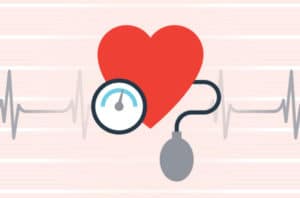
As we age, we face a myriad of unique challenges regarding maintaining our overall general health. Not only do we need to focus on eating a healthy diet and getting regular exercise, but we also have to be aware of our own body’s resilience and the damaging effects of a poor diet or lifestyle on our wellness.
One of the most important things we can do to help promote longevity as seniors is to take a closer look at our blood pressure. High blood pressure, also known as “hypertension,” claims nearly a half-million lives each year. Furthermore, it can lead to serious complications such as a stroke and heart disease — the leading causes of death for Americans.
Problems Caused By Hypertension
Unfortunately, high blood pressure can be a silent killer, as the cumulative damage can gradually take its toll on you over the years. While it may not be immediately lethal, the damage can already be done, long before you even start to notice it.
Some of the more devastating complications that can arise from uncontrolled hypertension can include:
- Heart attack
- Stroke
- Kidney disease
- Heart failure
- Angina (chest pain)
- Aneurysm
- Dementia
- Vision loss
- Death
However, by maintaining a healthier diet and engaging in gentle fitness, you can help prevent these issues from occurring. Please note that you do need to speak to your healthcare provider before making any major changes to your diet and exercise regimen, though.
The New Diagnostic Guidelines
Generally, as we age, our blood pressure tends to go up. Nevertheless, health experts firmly recommend that you try to keep that number lower for your overall health. What may have been a normal, healthy blood pressure reading in your 20s or 30s can be quite dangerous in your 50s, 60s, and older.
In 2017, the American Heart Association (AHA) — alongside ten other reputable heart health organizations — made changes to the previously accepted blood pressure guidelines. Previously, the diagnosis for hypertension was measured at 140/90 mm Hg (millimeters of mercury) for patients under the age of 65. For those of us over the age of 65, it was 150/80 mm Hg.
Now, though? Any reading over 130/80 mm Hg, regardless of age, is considered high. The previously accepted criteria for health is now considered Stage 2 hypertension, and a reading of 180/120 mm Hg is now recognized as a hypertensive crisis.
The Importance of Testing
As research changes and evolves, so will the guidelines from our health professionals. Indeed, the importance of regularly checking your blood pressure cannot be overstated. For example, in the past, one of the leading causes of death for women was cervical cancer. A simple cervical health screening, though, can help detect the early stages of this lethal type of cancer.
Just like Pap smears save lives, so do routine blood pressure checks. Unlike a Pap smear, though, you do not need to schedule a doctor’s appointment to monitor your blood pressure. You can keep tabs on it from the comfort of your own home, with a basic blood pressure cuff. They are generally quite affordable, but they can still offer a profound benefit to your wellbeing.
Staying Healthy No Matter Your Age
If you have been diagnosed with high blood pressure, there are a few things you can do to help lower it. Your healthcare provider may prescribe medications to help you manage it. They may also recommend that you change up your diet and try to sneak some exercise into your day-to-day routine. You may be told to find ways to manage your stress. It is possible that they may also advise that you lose weight.
Certain diets have been shown to help lower your blood pressure, such as the DASH diet. The DASH diet (“Dietary Approaches to Stop Hypertension”) has been shown to help reduce your blood pressure and help maintain healthy levels. It focuses on lowering sodium and eating foods that are rich in nutrients like magnesium, potassium, and calcium.
Fortunately, by making these key changes to your diet and lifestyle, you can possibly reduce and even reverse some of the damage that chronic hypertension may have caused to your body. For instance, if you smoke, it is always a good idea to stop. Not only can you help lower your blood pressure, but you can also help prevent your risk of developing smoking-specific cancers.
Healthcare has advanced significantly over the years, and today’s seniors can still live equally rich and rewarding lives as their younger counterparts. By focusing on maintaining healthy blood pressure levels, you can look forward to better health at all stages of your life!